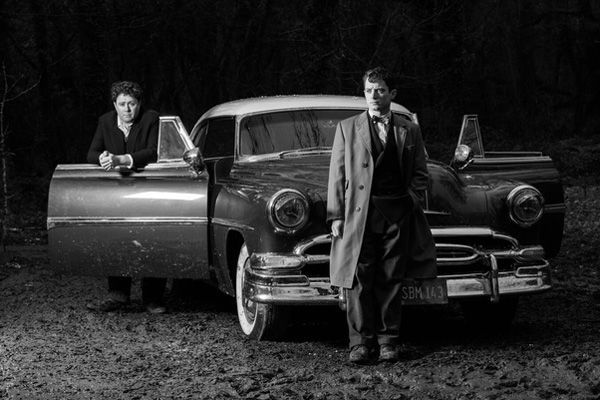Eye For Film >> Movies >> Set Fire To The Stars (2014) Film Review
Set Fire To The Stars
Reviewed by: Andrew Robertson

Black and white, tending sepia, Set Fire To The Stars is old fashioned film-making. Based on an episode in the existence of the poet Dylan Thomas, his first tour to America, an event that caused the organiser, one John M Brinnin, to reconsider his relationship with poesy and poetics, to craft a book, Dylan Thomas In America, that was controversial in its time and forms the basis for this film - though it takes pains to state that there are liberties taken, fictions inserted, albeit in the credits, post-facto, when whimsy or bravery might have had it start with a declaration of poetic license.
It's the past, so everybody smokes. Great plumes of it, tight spirals, hazy wispy curls that drag the eye across hands and faces. Ashtrays everywhere, beside gymnasium chairs, bath tubs, everywhere the paper packets, the matches, the lighters, on street corners, in public houses. It might be accuracy, but it obfuscates, sometimes visually, sometimes tonally - this one post-coital, this one calms the nerves, this one is to be polite, this one fills the space, this one is another indicator of a place alien to us. This is the past, so everybody smokes.

A labour of love, this, produced by Elijah Wood, the oblivious amanuensis Brinnin, co-written by Celyn Jones, the oblivion insistent Thomas, directed with further writing done by Andy Goddard. Wood gives this star power, Goddard's return to film after years in the televisual trenches, Jones... Jones brings heft and despair, roly-poly rough-housing all contrasts to repressed professor Brinnin to who he seems at times to serve as, call him a magical Welshman. "Don't open a book, open a window!" the film exhorts, which is an odd basis for a film based on a book about a poet.
Odder still some choices - Wales does creditable service as New York, backwoods upstate, Cardiff here calling in her markers to serve understudy to Toronto, or any of the other world cities that make movies wearing other names, other street signs. The miracle of technology gives us skylines, when appropriate, all neon and snow and familiar buildings in silhouette, but more often close focused - wooden lockers, modeish kitchens, wood-panelled meeting rooms and backstage fire-buckets. This could be anywhere and in a way it is - not America, not truly, but America, America as she is imagined. A visit to a diner trots out that aluminium-sided argot, sliders and red-eye, ostensibly obfuscatory drive-in dialect perhaps intended to set us in time and place but instead, to some extent, making pretense plain.
Perhaps intentional - for all its humdrum academic politicking, its observation that it's fun to visit drunks but not to live with them, that creatives are often wracked by self doubt, its got a good line in more than troubling contrasts. Wood is small and spare, a moment of rebellion (sunglasses and all) quashed by social expectation. Jones is manic, depressive, ebullient and bullish, only ever one glass away from the china shop. The soundtrack by Super Furry Animals alum Gruff Rhys is interesting, though one wonders at the decision to fade strings in over Thomas' recitals, to replace the music of the word with violin-coded emotional cues. There are subtler moments - Thomas asks for a milkshake, Tootsie Rolls, a Superman comic, but in that hyper-Americana is perhaps a clue - Clark Kent is the costume, after all, a part an orphaned exile plays to blend in. So too Thomas, so too Brinnin? So too likely to be over-analysis in a film that desperately pushes us to feel?
When it delves into the different: a montage of voices, faces disparate, poetry to declaim; when Thomas reads a fateful letter from Caitlin, when she reads her letter to him, a vengeful woodland spirit in a cloud of lavender and guilt, a dryad in a flower-print dress; when Kevin Eldon and Shirley Jackson visit and it leads to spooky stories; these are flashes of invention lost when we are in a period Packard parked.
Even with centenary year approaching it's hard to see to whom this ode is essayed, beyond funding bodies, beyond devotees of wee Elijah, beyond an audience for films about poets that one must assume is larger than the audience for poetry because films are more expensive. It's too sweary for academe, a point it makes itself at one point, too fictionalised for reference, and if it is itself poetry it's not Romantic - this is no beautiful moment recalled at leisure, more a document of trauma with a bit of rhythm. Set Fire To The Stars never quite catches, but that's not to deny the chemistry between its leads or the artistry of its approach, but the reactions it elicits seem colder than they ought. That's not to say that all observers will be unmoved by it, unwarmed, but despite its theme it feels a little too clinical, procedural, when something more experimental might have shone.
Reviewed on: 23 Jun 2014
















